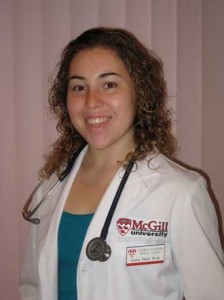
Medicine student has high – really high – hopes
By Jim Hynes
A McGill medical student hopes that a “long educational journey” will one day allow her to embark on one of the greatest journeys of all.
Second-year Medicine student Laura Drudi wants to combine her passions for space exploration and health sciences to join the list of McGillians who’ve gone on to become astronauts.
The 21-year-old Montreal native wants to become an astronautical physician – that’s space doctor to you and me. She’s known about the astronautical part since she was nine years old and met Canadian astronaut Dr. Dave Williams while on a Grade 4 field trip to the Space Science Centre in Laval’s Cosmodome. The physician part came later, after her grandmother was diagnosed with cancer.
“For the longest time I thought I would go into aeronautical engineering,” says Drudi who switched from Pure and Applied Sciences to Health after her first year of CEGEP. “After my grandmother got sick, I was spending all my time in hospitals. And I wanted to learn more about cancer, so I started to do cancer research at the same time, and then I thought ‘Let’s see if I can combine these two interests’.”
At first, Drudi didn’t even know if there was such a field as astronautical medicine.
“I wasn’t sure I would be able to find anything in space and medicine, but then I got all these hits on Google. I thought ‘Oh my goodness, there are actually programs. I can pursue this.’ I became very excited.”
“Everything is altered in the space environment,” says Drudi, who is also a Flanker on McGill’s rugby Martlets. “What really attracts me to space medicine is that even though it is very specialized, it’s very general at the same time. Because you are applying every single aspect of human physiology and medicine that we’ve learned over the years to this extreme environment.”
So where does one train to be an astronautical physician? Drudi says that no programs of the kind exist in Canada just yet, but she has her eye on a University of Texas Medical Branch that offers a civilian aerospace residency where someone can train to become a flight surgeon. She intends to enrol there after completing her studies at McGill. After that, Drudi hopes to undertake a PhD in space life sciences at the only school in the world that offers it, Germany’s Helmholtz Institute, an aerospace medicine college specialized in understanding the effects of microgravity on the human body.
“Hopefully that will work. After that, I want to practice as a flight surgeon, do research, and then apply for the astronaut training program at NASA,” she says.
Drudi is already well on her way in what she calls the “long educational journey” she needs to complete to make her dream come true. She has been in touch with the Canadian Space Agency (CSA) for a number of years, beginning in her CEGEP days when she would visit elementary schools to give presentations about space exploration. Last year, her contact at the CSA told her about an international astronautical congress being held in Deajeon, South Korea in October 2009. Drudi applied and was accepted as one of the 26 Canadian students and professionals the CSA sponsored to attend it. During a student plenary session at the event, she gave a presentation on space life sciences.
“It was an amazing experience, a tremendous opportunity to network with leaders and maybe future colleagues in this field,” Drudi says. “I was so glad, and humbled, to be there.”
Drudi is also an Order of Canada Mentorship Program recipient. She recently returned from a trip to Ottawa where she and her fellow program members met with Canada’s Governor General, Michaëlle Jean, who founded the program in 2008.The Mentorship Program pairs 25 Canadians aged 18 to 25 with members of the Order of Canada sharing the same field of interest. Drudi’s partner is Dr. Thomas Brzustowsk, a mechanical engineer with long ties to the aerospace industry. As part of the program, the two must produce a paper about the benefits of manned space flight and the role Canada might play in it.
“Right now Canada is known for its robotics,” Drudi says, “but it could definitely be a pioneer in space life sciences.”
The next small step in Drudi’s giant leap for space might take place as early as next summer. She has applied for a NASA internship that is given to one Canadian student every year. But whether she is successful or not, the dream will go on.
“My ultimate goal is to represent Canada as an astronaut. That’s the dream, get on a mission.”
